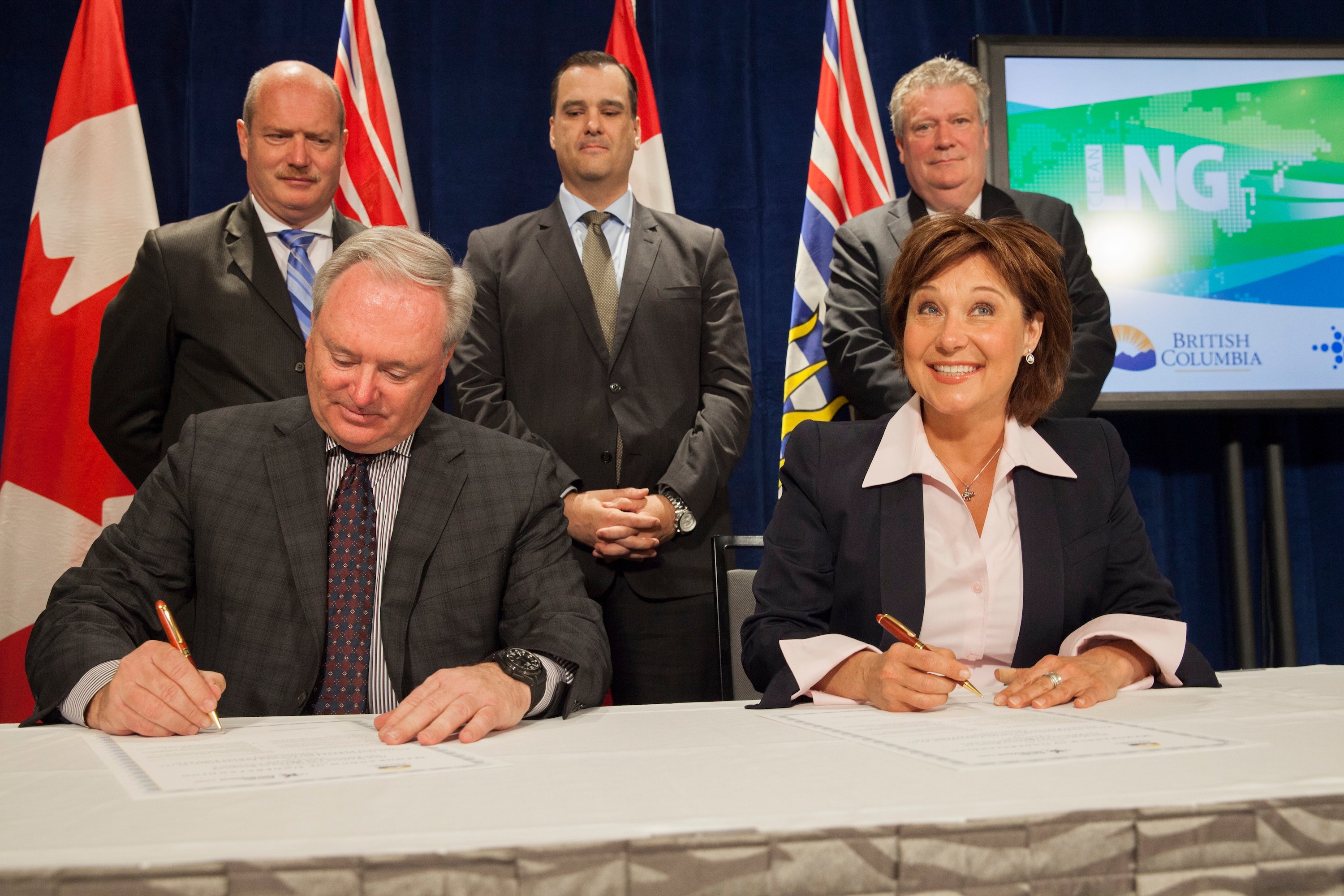Christy Clark's LNG pipe dream is falling apart

“It’s good for the world,” Harvard economist Dr. Michael E. Porter told the Globe 2016 conference on sustainable development in Vancouver last week. “It’s good for China. It’s good for lots of other people in the world who really care about climate. We should be exporting (it) as much as possible.”
‘It’ is liquid natural gas, LNG, the hydrocarbon product that’s being offered up by politicians and the energy industry as the magic bullet for both the climate and Canada’s energy economy. At that same conference, Prime Minister Justin Trudeau spoke of the need “to generate wealth from our abundant natural resources to fund this transition to a low-carbon economy.”
Premier Christy Clark has been promoting LNG as the means to pay off the provincial debt while still reducing B.C.’s carbon footprint. Paradoxically, the task of cutting Canada’s carbon emissions is being tied to increasing fossil fuel production by some academics and the oil and gas industry.
The case for Canadian LNG is, of course, a lot more complicated than its fans suggest.
What drives a project like B.C.’s LNG is the difference between what natural gas sells for in North America and what it sells for in foreign markets like Asia. That difference is what makes the case — or doesn’t — for companies like Shell and Petronas to spend tens of billions of dollars building LNG facilities in B.C.
Prices for LNG in Asia tumbled at the beginning of 2015 by 40 per cent, or $7 per million BTU, due to a supply/demand imbalance and the falling crude price. Since North American prices are around $2 per million BTU, there’s no way to make up that gap. Unless the LNG companies were working on a very conservative pricing forecast, the economic argument behind B.C.’s LNG push has taken a painful hit.
The International Energy Agency predicts growth in global demand for natural gas of only 2 per cent annually. But the global LNG supply is expected to explode 40 per cent between now and 2020, mostly due to Australian and American projects. Japan, the world’s largest LNG importer, is expected to drop its demand for the fuel by 10 per cent by 2020 as its nuclear reactors return to full service. China remains a big unknown; it could swing to LNG instead of coal, but it also has large deposits of shale gas it could tap as well.
Shell received a number of permits for its Kitimat project earlier this year, but put off making a final decision until the end of the year at the earliest. Other projects are also in limbo. For energy companies everywhere struggling with low crude prices, cashflow is a concern — so they’re scaling back their capital plans. Will the B.C. projects make the cut?
The IEA doesn’t seem to think so. “Those projects currently under construction today,” the agency says in a recent report, “are set to come on stream broadly as planned, as large upfront capital costs have already been incurred. Beyond that, however, new LNG plants will struggle to get off the ground. Today LNG prices simply do not cover the capital costs of new plants.”
Let’s talk about those greenhouse gas emissions for a moment. The U.S. Department of Energy (DOE) made an estimate of full life-cycle carbon emissions from generating electricity, comparing two fuel sources: LNG and coal. LNG produces about 60 per cent of the GHG emissions of coal — 20 per cent of that due to fugitive methane emissions along the way. No one knows right now the size of those fugitive emissions; the DOE basically had to guess.
While industry is looking for ways to improve its processes, it doesn’t really know the exact size of those methane losses either. That may affect the future demand for fracked LNG as the world moves to decarbonize, depending on how successful industry is at improving its performance on fugitive methane.
Malaysia’s Petronas is in a corner over LNG, having spent $12 billion developing the project already. The company says it doesn’t care that much about an immediate return. It is, however, very concerned about the Trudeau government’s position that such projects need to be vetted from a climate change perspective — a position that seems to counter Porter’s argument that LNG is great for the climate.
Oversupply and low prices make B.C.’s LNG terminals a difficult sell. Based on what we know right now, the people claiming LNG would be a boon for the environment seems to have overstated their case.
Ross Belot is a retired Canadian energy industry manager who has been working in global energy markets for decades with a focus on supply and economics. He is a published author, photographer, documentary short filmmaker and is currently enrolled in the MFA program at St. Mary’s College of California.
No comments:
Post a Comment
Comments always welcome!